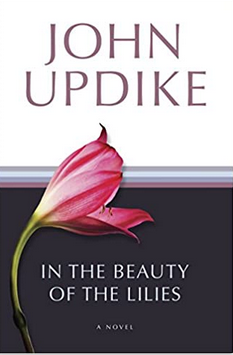In “John Updike’s ‘In the Beauty of the Lilies’: The Children” (The Imaginative Conservative, Aug. 19, 2023), Daniel J. Sundahl began with two quotes from Updike:
“As to critics, it seems to be my fate to disappoint my theological friends by not being Christian enough, while I’m too Christian for Harold Bloom’s blessing. So be it,” and “The mature and well-balanced man, standing firmly with both feet on the earth, who has never been blamed and broken and half-blinded by the scandal of life, is such the existentially godless man.”
 Mid-way through his essay, Sundahl remarked, “Of course there’s religion and then there’s religion and there are books and there are dirty books. . . which raises the question: Can one write about life, even life’s carnality and concupiscence, while maintaining Christian aspects?” He also, of course, attempted to answer his own question in a classical, meandering way, prompted by the last words (“the children”) of Updike’s novel, In the Beauty of the Lilies.
Mid-way through his essay, Sundahl remarked, “Of course there’s religion and then there’s religion and there are books and there are dirty books. . . which raises the question: Can one write about life, even life’s carnality and concupiscence, while maintaining Christian aspects?” He also, of course, attempted to answer his own question in a classical, meandering way, prompted by the last words (“the children”) of Updike’s novel, In the Beauty of the Lilies.
“I became fond over the years of the many contradictions regarding parents’ expectations about religion and literature, which included a smallish broo ha ha with a fundamentalist father when he learned his daughter would be reading a John Updike novel in an upper division American Literature course devoted to American Contemporary Fiction—the father arguing that although he had never read Updike he believed him scandalous and a writer of titillating, stylized pornography. Those are my words not his . . . which was singular: ‘dirty.’
“And he has a point and a good one, and I am not without empathy. As with many writers whose personal life and writings own a certain kind of ‘smudginess,’ greasy fingers on the pages, Updike is no exception. His embrace of realism as an artistic criterion (often concerning the breakdown of a marriage) is often passé these days and with gray humor. One question that emerges is whether a narrative Updike presents to his readers is a full and authentic report of human experience, which includes the particulars of the times and places of the narrative’s action, which would argue that Updike is a formal realist. Like his characters, he also put himself through many personal hardships. He had faults, and they were ‘smudgy’ and blurred.”
